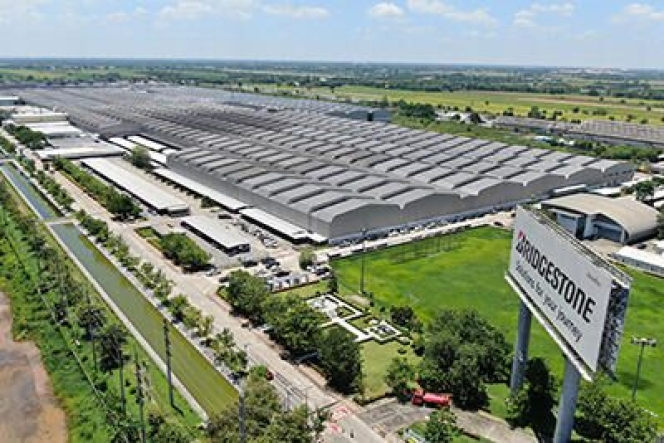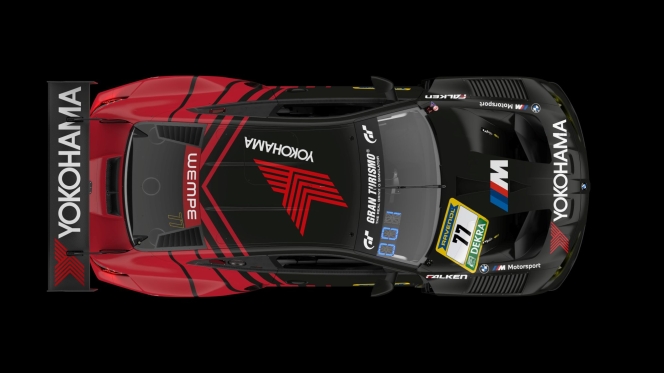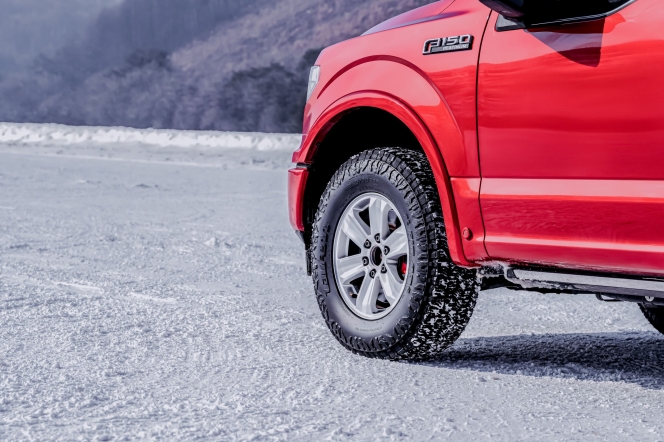Bridgestone Streamlines Thai Tire Manufacturing Operations for Efficiency
- By TT News
- October 30, 2023

Bridgestone Corporation has announced the consolidation of its tyre manufacturing operations in Thailand. This move is in line with Bridgestone’s Mid-term Business Plan (2021-2023) to enhance earnings and maintain industry leadership. The restructuring involved ceasing tyre production at the Rangsit plant of THAI BRIDGESTONE CO., LTD. (TBSC) and reorganising operations at other facilities.
Specifically, passenger radial tyre production has been centralised at the Nong Khae plant of TBSC, completed on June 30, 2022. Similarly, manufacturing operations for truck and bus radial tyres have been consolidated at the Chonburi plant of BRIDGESTONE TYRE MANUFACTURING (THAILAND) CO., LTD., a process completed on October 27, 2023.
Bridgestone meticulously considered various factors, including local community impact, to establish an optimal supply structure and maintain competitiveness. The company extends its gratitude to the employees and supportive local community of the Rangsit Plant, a pivotal foundation of Bridgestone’s tyre business in Thailand. To mitigate the impact on affected employees and communities, Bridgestone is implementing appropriate measures in line with local laws, regulations, and labour agreements.
Michelin Becomes Official Partner Of Rocket League Championship Series 2026
- By TT News
- March 03, 2026

Michelin has announced a strategic collaboration with BLAST, the organiser behind the 2026 Rocket League Championship Series (RLCS), which serves as the premier global tournament for the popular video game Rocket League. Through this agreement, Michelin becomes an official partner of one of the most energetic and widely viewed eSports properties on the international stage.
Rocket League itself enjoys immense global popularity, attracting several million active participants on a monthly basis. The RLCS season consistently draws tens of millions of views across the world, underscoring its significant reach. This move allows Michelin to deepen its involvement in the competitive gaming sector by associating with a high-profile series known for its passionate following.
The game’s core dynamic involves vehicles competing in a fast-paced arena where precision, control and rapid execution are paramount. These very attributes closely align with Michelin’s established heritage in mobility solutions and high-performance engineering, particularly its extensive background in motorsport. The partnership therefore represents a natural extension of the brand’s core principles into a digital environment.
By entering the world of the RLCS, Michelin seeks to enhance its connection with younger demographics and solidify its relevance within the digital spaces that are increasingly defining future trends and cultural habits. This initiative builds on a foundation of over 25 years during which Michelin has cultivated partnerships within the gaming and automotive simulation spheres, consistently applying its technological know-how to support both realism and superior performance in virtual driving experiences.
- Yokohama Rubber
- Yokohama ADVAN Tyres
- Nürburgring 24-Hour Race
- Nürburgring Langstrecken-Serie
- BMW M Motorsport
Yokohama Becomes BMW M Motorsport’s Official Tyre Partner For 2026 Nürburgring Events
- By TT News
- March 03, 2026

The Yokohama Rubber Co., Ltd., has entered into a new agreement to serve as the official tyre supplier for BMW M Motorsport, the division responsible for the brand's global racing endeavours. This collaboration will debut at the prestigious Nürburgring 24-Hour Race and throughout the Nürburgring Langstrecken-Serie in 2026.
This renewed partnership revives a historical connection between the two companies, who previously worked together on the same iconic circuit from 1980 to 1990. During that initial decade-long stint, their combined efforts secured two overall victories. After an interval of nearly four decades, they are reuniting for the current season to compete in the premier SP9 class, fielding the BMW M4 GT3 EVO. For this campaign, Yokohama will equip the vehicle with its high-performance ADVAN racing tyres, with the shared objective of capturing another overall win.

Beyond its tie-up with the BMW team, Yokohama Rubber continues its longstanding commitment to the Nürburgring. It will provide its tyres to numerous leading teams contesting both the endurance series and the 24-hour event this season. The company is focused on achieving an overall championship victory for a vehicle equipped with its YOKOHAMA brand tyres.
Franciscus Van Meel, CEO, BMW M GmbH, said, “We are excited to welcome YOKOHAMA as Official Partner of BMW M Motorsport for our Nürburgring programme. YOKOHAMA’s technical expertise and motorsport passion strengthen our drive for maximum performance and precision. Their support allows our team to focus fully on what defines BMW M Motorsport: pushing the limits on every lap. We look forward to a strong endurance season.”
Team: Schubert Motorsport
Class: SP9
Car: BMW M4 GT3 EVO
Tyres:
ADVAN A005 (for dry conditions); Sizes: front 300/680R18, rear 330/710R18
ADVAN A006 (for wet conditions); Sizes: front 300/680R18, rear 320/710R18
Race Schedule (as of date of this release)
March 14 (Sat): NLS Round 1
March 21 (Sat): NLS Round 2
April 11 (Sat): NLS Round 3
April 18 (Sat) –19 (Sun): Nürburgring 24-Hour Race (Qualifiers) , NLS Rounds 4 & 5
May 14 (Thu) –17 (Sun): Nürburgring 24-Hour Race
June 20 (Sat): NLS Round 6
August 1 (Sat): NLS Round 7
September 12 (Sat) –13 (Sun): NLS Rounds 8 & 9
October 10 (Sat): NLS Round 10
Second-Generation Laufenn X FIT AT2 All-Terrain Tyre Launched In US
- By TT News
- March 03, 2026

Hankook Tire has introduced the Laufenn X FIT AT2, a new addition to its all-terrain tyre lineup aimed at drivers who require durability and adaptability without compromising on everyday driving comfort. Positioned as an affordable option, this tyre is engineered to handle a mix of on-road and off-road conditions while delivering long-lasting value.
Building upon the foundation of its predecessor, the X FIT AT2 brings several performance upgrades. It features enhanced traction across varied landscapes, a 15 percent improvement in tread longevity and reliable handling in different weather conditions. The tyre is designed to fit a broad spectrum of light trucks and SUVs, with availability ranging from 15 to 22 inches to accommodate popular vehicle models in the market.
This launch reflects Laufenn’s ongoing strategy to diversify its offerings as it strengthens its presence in over 100 countries. Since its introduction in Europe, the brand has consistently expanded its range for both passenger vehicles and commercial applications, responding to shifting consumer needs. The X FIT AT2 reinforces this direction by providing a balance of rugged capability and composed road manners for those who frequently transition between highways and rougher terrain.
Engineered for resilience, the tyre incorporates a reinforced structure, including select sizes with three-ply sidewalls to resist cuts and impacts. Its tread design features directional and lateral grooves that enhance water dispersion and grip on slippery or loose surfaces. Additional protective elements such as offset shoulder blocks and rim guards help shield against debris and curb damage. A two-step deep sipe pattern promotes uniform wear, contributing to extended usability.
Certified with the Three-Peak Mountain Snowflake symbol, the X FIT AT2 offers dependable performance in dry, wet and snowy winter conditions. It comes with warranty coverage tailored to its sizing, offering 60,000 miles for P-metric versions and 50,000 miles for LT-metric options. With this release, Laufenn continues to round out its portfolio alongside existing lines such as the S FIT, G FIT and I FIT series.
KC Jensen, Vice President – U.S. Passenger Car and Light Truck Sales, Hankook Tire America Corp, said, “The X FIT AT2 represents the next step forward for the Laufenn brand as we continue to deliver practical, dependable solutions for everyday drivers who also want the freedom to explore off-road. Building on the success of the original X FIT AT, this second-generation tyre offers a stronger blend of durability, versatility and everyday comfort at an accessible value.”
Comerio Ercole To Showcase Calendering And Digital Solutions At Two Premier 2026 Trade Fairs
- By TT News
- March 03, 2026

Comerio Ercole is set to make a significant impact on the global stage in 2026 with its participation in two major industry exhibitions. The company will showcase its latest advancements at both Chinaplas 2026 and Tire Technology Expo 2026, highlighting a comprehensive portfolio designed to enhance precision, productivity and sustainability in polymer processing.
At Tire Technology Expo, Comerio Ercole will present integrated systems tailored for the tyre industry, focusing on high-performance rubber calendering and digital intelligence. A flagship solution is the TRIPLE 4-roll calendering unit. Its innovative "S" configuration provides remarkable flexibility by enabling the processing of both textile and steel cord, as well as the production of rubber sheeting, all within a single line. The system’s capability for simultaneous lamination ensures high precision and product stability while minimising defects. Downtime is a critical factor in tyre production, and the patented FASTEEL system directly addresses this. By automating the steel cord change process, it dramatically reduces changeover time from hours to minutes, allowing the line to continue running during preparation and thereby maximising plant availability and operator safety. Following the calendering process, the SUPERCUT system guarantees clean, precise transversal cuts for both steel and textile-reinforced rubber, integrating guillotine and high-speed rotary blades to minimise waste and streamline downstream winding.
Simultaneously, at Chinaplas 2026, taking place in Hall 2.1 at Stand C85, the company will place a strong emphasis on its patented HYDROPLUS concept for PVC and plastic calendering. This technology suite is engineered to deliver micrometric precision and robust process stability through advanced hydraulic controls. Central to this is HYDROGAP, a system that achieves exceptional thickness uniformity with high-resolution gap positioning. Complementing this are HYDROSAFE, which ensures rapid roll separation for ultimate protection, and HYDROTHERM, a feature that intelligently compensates for thermal expansion to maintain precise gap settings during fluctuating operational temperatures.
Beyond mechanical innovation, the company is driving digital transformation with its CELEMETRY and MINERV-AI platforms. CELEMETRY focuses on sustainability by converting production data into actionable insights for environmental reporting and energy optimisation. MINERV-AI captures and standardises operational expertise through artificial intelligence, supporting more effective maintenance protocols, training procedures and overall operational consistency. Through these combined efforts at both exhibitions, Comerio Ercole is demonstrating a holistic approach to advancing the plastics, rubber and tyre industries.







Comments (0)
ADD COMMENT